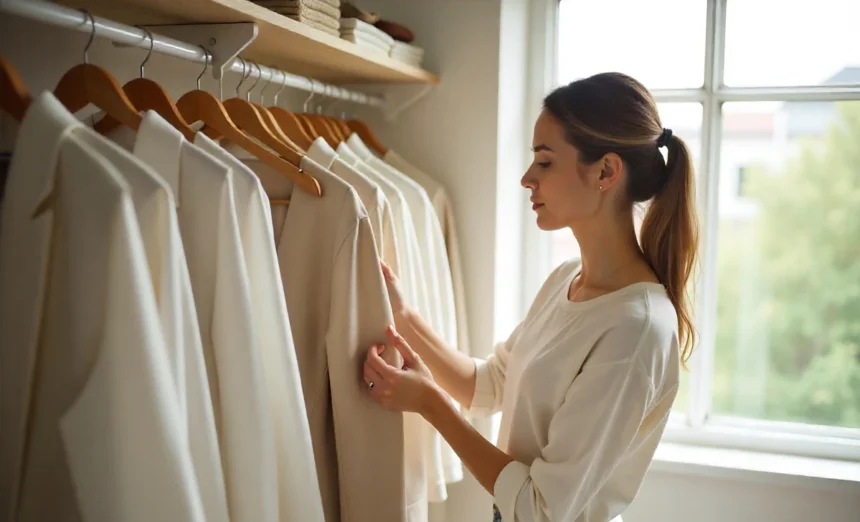You’re standing in front of a closet bursting with clothes, yet somehow you still have “nothing to wear.” Sound familiar? You’re not alone in this fast fashion burnout that’s hitting shoppers everywhere in 2025.
Smart shopping for sustainable fashion means buying fewer clothing items, but choosing them with real purpose and lasting quality in mind. With rising costs and growing environmental awareness, more people are discovering that less truly can be more when it comes to personal style. These underconsumption fashion tips 2025 are becoming essential for anyone seeking sustainable style without compromise.
What Underconsumption Means in 2025
It’s Not About Deprivation—It’s About Intention
Let’s clear up a big myth right away. Underconsumption isn’t about never shopping or living like a monk in beige robes.
It’s about becoming incredibly selective with what you bring into your wardrobe. Instead of grabbing five trendy pieces that’ll fall apart in three months, you invest in one beautiful item you’ll treasure for years. This shift toward intentional shopping helps you develop a signature style that reflects who you are, not what Instagram tells you to be.
When you practice underconsumption fashion tips 2025, you’re essentially becoming your stylist through intentional wardrobe planning. You start asking better questions: “Will I wear this at least 30 times?” and “Does this piece work with what I already own?” These simple checks can transform your entire relationship with shopping from impulsive to intentional.
Roots and Modern Rise
This isn’t some brand-new concept that appeared overnight on social media feeds.
The practice has deep historical roots in make-do-and-mend philosophies that our grandparents lived by during tougher economic times. From there, it evolved through minimalist fashion trends and capsule wardrobe concepts before exploding into today’s TikTok phenomenon with over 35 million videos using #underconsumptioncore.
What makes the 2025 version different is how it’s being embraced by a generation facing both climate anxiety and financial pressure. Young shoppers are rediscovering that timeless wardrobe building isn’t just trendy—it’s practical survival in an expensive world.
Why It’s More Than a Trend
While the “-core” aesthetic might fade from social media, the core values behind underconsumption are here to stay.
This movement celebrates longevity, heritage fashion brands, and developing an emotional connection to your clothes through conscious fashion buying habits. It’s about choosing pieces that tell your story rather than wearing someone else’s idea of what’s “in.” These evergreen principles of quality over quantity in fashion have guided smart shoppers for generations, and they’ll continue long after the hashtags disappear.
The Financial Times recently highlighted how luxury minimalist brands like The Row and Tove are thriving by offering exactly this: understated designs that reflect a cultural shift toward slow fashion trends 2025.
The Real-Life Benefits of Dressing with Less
Clarity and Confidence in Your Style
When you own fewer pieces, each item in your closet has to earn its place.
This natural selection process forces you to identify what you truly love versus what you bought on impulse. As stylist and researcher Katia Dayan Vladimirova notes, developing a strong personal style can be a “radical act” that reduces overconsumption while boosting your confidence.
Think about it: When you own fewer pieces that you love, getting dressed becomes effortless instead of stressful through this personal style development strategy. You stop second-guessing yourself because you know every piece was chosen with intention and works harmoniously with your lifestyle.
Saving Money Without Sacrificing Style
Here’s where underconsumption gets really practical for your wallet in 2025’s tough economy.
According to recent data from Grist, over 50% of Gen Z shoppers are avoiding fast fashion partly because nearly 60% live paycheck to paycheck, seeking fast fashion burnout solutions. The most effective underconsumption fashion tips 2025 recognize that buying fewer but better-quality pieces is essentially playing the long game with your money. One well-made blazer that lasts five years costs less per wear than five cheap ones that fall apart.
This approach also eliminates what experts call “hidden costs” of fast fashion: the constant need to replace items, dry cleaning bills for delicate synthetic fabrics, and storage solutions for overflowing closets. When you practice sustainable style without compromise, your budget naturally becomes more manageable and predictable.
Lowering Your Fashion Carbon Footprint
Every piece of clothing has an environmental story, from water usage to transportation emissions.
When you embrace underconsumption, you’re automatically reducing your fashion footprint through eco-conscious fashion choices without having to become an environmental science expert. Fewer purchases mean less demand for resource-intensive manufacturing processes, and choosing quality items means less textile waste ending up in landfills.
This environmental benefit often motivates people to stick with underconsumption even when the initial novelty wears off. It feels good to know your wardrobe choices align with your values about taking care of the planet.
How to Shop Less But Better With a Timeless Wardrobe Building Guide
Step 1: Audit Your Closet
Before you buy anything new, you need to understand what you already own through wardrobe decluttering methods.
Set aside a weekend morning and pull everything out of your closet. Create three piles: love it, maybe, and never wear it. Be brutally honest about which pieces make you feel confident and which ones you skip over every single day.
For items in the “maybe” pile, use the 30-wear rule for clothes: if you can’t imagine wearing something at least 30 times, it doesn’t deserve space in your curated wardrobe. This simple test helps you identify gaps in your wardrobe versus emotional purchases that don’t serve your actual lifestyle.
Step 2: Invest in Quality Over Quantity
Now comes the fun part: choosing investment fashion pieces that will serve you for years, not months.
Look for heritage fashion brands known for their craftsmanship, or seek out items made from natural fibers like wool, linen, and silk that age beautifully. These seasonless wardrobe essentials might cost more upfront, but they develop character over time rather than falling apart after a few washes.
When shopping, examine construction details: Are the seams straight? Do the buttons feel substantial? Can you imagine this piece looking even better after some gentle wear? These quality markers help you distinguish between items that will become wardrobe staples versus expensive mistakes.
Step 3: Shop Second-Hand or Vintage
Thrift stores and consignment apps offer excellent second-hand shopping tips for underconsumption enthusiasts.
Shopping second-hand lets you access higher-quality pieces at lower prices while giving existing clothes a new life instead of contributing to overproduction. You might find a perfectly broken-in leather jacket or a vintage silk blouse that would cost hundreds new.
Popular platforms like Vinted, TheRealReal, and Depop make it easier than ever to find thrift and consignment fashion finds. The key is patience: great vintage pieces aren’t always available in your size immediately, but when you find them, they often become your most cherished wardrobe items.
Step 4: Maintain & Repair
Learning basic make-do-and-mend clothing repairs transforms good pieces into lifelong companions.
Simple skills like sewing on buttons, hemming pants, or patching small holes can extend your clothes’ lifespan by years. You don’t need to become a master tailor—just knowing how to handle minor repairs saves money and reduces waste.
Many cities also have local tailors and seamstresses who can handle bigger alterations. Building relationships with these craftspeople becomes part of your underconsumption practice, helping you maximize every piece’s potential rather than discarding items for minor issues.
Step 5: Delay Purchases
The 24-48 hour pause is your best defense against impulse buying.
When you see something you want, add it to a digital wishlist instead of your shopping cart. Sleep on it, and revisit the item after at least one full day. You’ll be amazed how often that “must-have” feeling fades when you give yourself time to think clearly.
This delay tactic works especially well for online shopping, where it’s easy to get caught up in flash sales and limited-time offers. Real quality pieces don’t disappear overnight, and if they do, there will always be other beautiful items that serve the same purpose in your wardrobe.
Debunking Myths About Underconsumption
“It’s Only for the Privileged”
This myth completely ignores underconsumption’s roots in practical necessity rather than lifestyle choice.
Many people have practiced these principles out of economic necessity for generations: buying less, repairing more, and making clothes last. Thrift shopping, clothing swaps with friends, and learning basic sewing skills are all accessible ways to embrace underconsumption regardless of your income level.
As author Aja Barber notes in ELLE magazine, “This is called living a normal life”—not some luxury trend reserved for people with unlimited budgets. The movement simply makes these practical approaches visible and celebrates them instead of treating them as something to hide.
“It’s Just a Trendy Aesthetic”
While underconsumptioncore might be trending on social media, the underlying principles align with centuries-old sustainable living practices.
The aesthetic elements—clean closets, neutral colors, quality fabrics—are simply the visual results of making thoughtful choices about what to own. The real value lies in the decision-making process, not in achieving a particular Instagram-worthy look.
Smart shoppers have always prioritized longevity over trends, invested in quality over quantity, and maintained their belongings with care. Social media just gave these underconsumption fashion tips 2025 a catchy name and helped people connect around shared values.
“It Means You Can’t Enjoy Fashion”
This misconception suggests that less variety equals less fun, but many underconsumption practitioners report the opposite experience.
When you own fewer pieces that you love, getting dressed becomes more enjoyable rather than overwhelming. You develop a deeper appreciation for each item’s unique qualities, and you often discover new ways to style familiar pieces.
Fashion enjoyment comes from feeling confident and authentic in what you wear, not from having endless options. Underconsumption helps you identify what truly makes you feel amazing, leading to more consistent satisfaction with your daily style choices.
Conclusion
As we move forward in 2025, underconsumption represents more than just a fashion trend—it’s a fundamental shift toward mindful living that benefits both your well-being and the planet. These underconsumption fashion tips 2025 aren’t just about choosing quality over quantity, investing in timeless pieces, and developing a deeper connection with your wardrobe; they’re about reclaiming your time, energy, and authentic self-expression while saving money and reducing environmental impact.
The journey from overconsumption to intentional fashion choices might feel challenging at first, but remember that every small step counts. Whether you start by implementing the 30-wear rule, exploring second-hand treasures, or simply pausing before your next purchase, you’re contributing to a more sustainable future while building a wardrobe that truly reflects who you are. In a world that constantly pushes us to buy more, choosing to buy less becomes a powerful act of self-care and environmental responsibility.
The most beautiful thing about implementing these underconsumption fashion tips 2025 is that they grow more rewarding over time. As you develop your style and learn to love each piece in your closet, you’ll discover that true fashion confidence doesn’t come from having endless options—it comes from knowing that everything you own was chosen with intention, care, and love. This is the future of fashion: thoughtful, sustainable, and uniquely yours.
FAQs
What is underconsumption core?
Underconsumption core is a social media movement celebrating the practice of buying fewer, higher-quality items and making the most of what you already own. It emphasizes repairing, reusing, and being intentional about purchases.
Is underconsumption affordable?
Yes, underconsumption often saves money long-term by reducing impulse purchases and focusing on cost-per-wear rather than upfront prices. Thrifting, swapping, and maintaining existing clothes make it accessible at any budget level.
Can I still buy trendy pieces?
Absolutely, but choose trends that align with your style and will work with your existing wardrobe. The key is being selective rather than buying every trend that catches your eye.
How do I start if I love shopping?
Begin by auditing your current closet and implementing the 24-hour pause before purchases. Redirect your shopping energy toward thrift stores and vintage shops where the hunt is part of the fun, but the environmental impact is lower.
What’s the difference between slow fashion and underconsumption?
Slow fashion focuses on ethical production practices and sustainable brands, while underconsumption emphasizes the consumer behavior of buying less overall. They complement each other beautifully—slow fashion tells you what to buy, and underconsumption tells you how much to buy.



